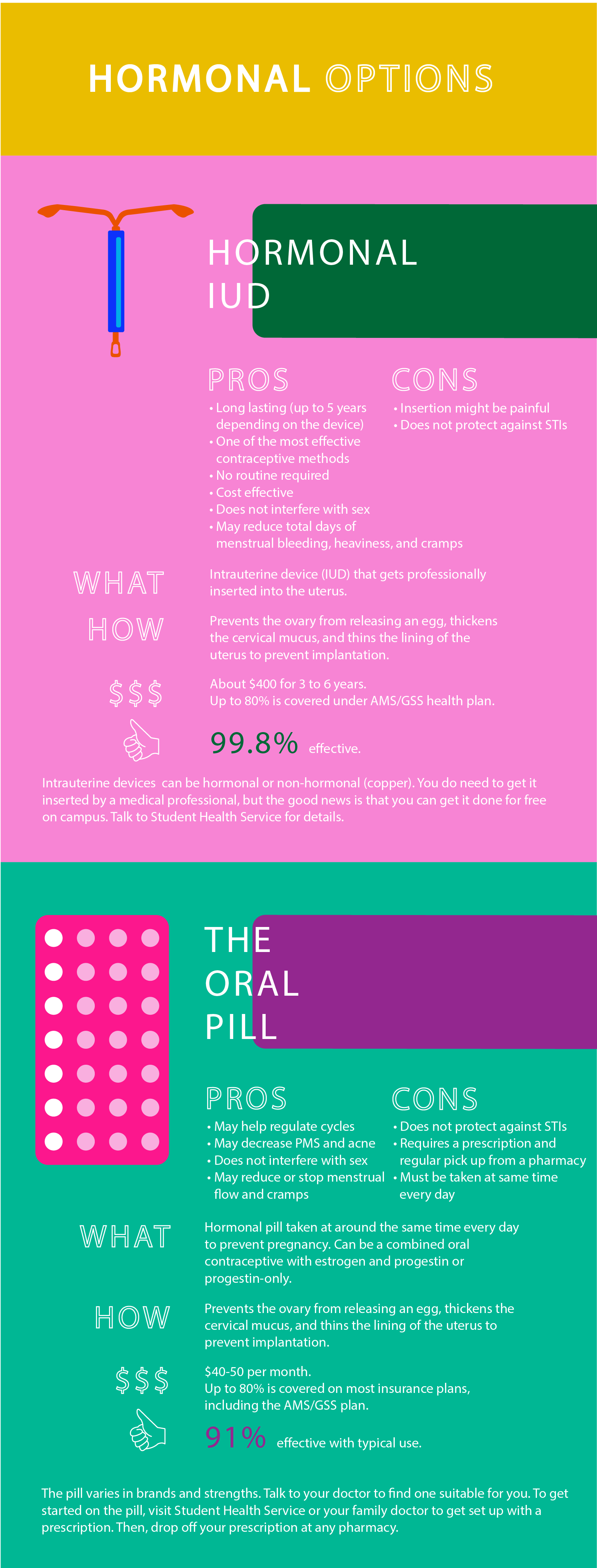At UBC’s Wellness Centre, there’s one question that Wellness Peers get asked a lot: “Where can I get birth control?”
Sometimes, it’s a panicked question we get a day or two after someone’s unexpected sexual experience. But, mostly, people are curious—and a little confused—about all the choices out there. Here at the Wellness Centre, we answer all types of questions about contraception and sell some options too (only non-hormonal), so let’s talk about it.
First off, let’s debunk some myths:
- Birth control doesn’t only mean the pill. Yes, the pill is a very common type of hormonal contraception, but it’s only one type of contraceptive. There are many more to choose from!
- Emergency contraception helps to prevent pregnancy, but is not intended for long-term contraceptive use and not 100% effective. Like its name states, it’s for emergencies!
Ok, now, what are the different contraceptives and how do I choose?
Contraceptives work in a few ways:
- Hormonal contraception changes hormone levels in your body to prevent ovulation, fluids in the cervix, and/or implantation into the uterus.
- Barrier and non-hormonal contraception involves using a barrier between the uterus and the sperm.
- Emergency contraception is meant to be used as an urgent method of pregnancy prevention as soon as possible after unprotected sex.
- Other methods include surgery and natural methods.
There are pros and cons to each type of contraceptive, and different options work well for different people. This article covers some of the most common ones students use. You can find out more about these and other methods at Sex & U.
Different methods can also be combined to make an even more effective contraception, like the pill and external condoms, or IUDs and the internal condom.
Hormonal options

Download the hormonal birth control options info sheet as a PDF:
Barrier & non-hormonal options

Download the non-hormonal birth control options info sheet as a PDF:
Emergency contraception (EC)
There are many reasons someone would use EC: missed hormonal method (pill, patch, etc.), the condom broke or slipped, sexual assault, or no contraception was used.

Download the emergency contraceptive options info sheet as a PDF:
For questions and to get reliable contraception information on campus, you can visit a nurse or doctor at Student Health Service or find out more at Sex & U.
Wait, did you think we’d leave without mentioning STIs?
Often, students ask about Sexually Transmitted Infections (STIs) at the Wellness Centre. Questions come up like, “Where do I go?” and “I don’t think I need to get tested, right?”
The answer is yes—make an appointment to get tested. Most people don’t notice symptoms when they have STIs.
On campus, you can get tested at Student Health Service (with an appointment). Off campus, STI testing can also be done at your family doctor's office, STI clinics, or at Options for Sexual Health clinics. No matter where you go, it's covered by your MSP basic health insurance.
Typically, it’s recommended you get tested every 3 to 6 months, or when you’ve been with a new sexual partner.
STI testing:
-
Can be done on campus by booking an appointment at Student Health Service
-
Usually involves taking a blood test, a swab of a vagina, or a urine sample
-
Can be different for different people, depending on what STI the person is at risk of
Although UBC offers a lot of resources, Sex & U is a great website for general information about almost anything to do with sexual health! For more information about sexual health at UBC, you can also visit students.ubc.ca. And as always, the Wellness Centre is open to support you and answer your questions.
*Contraception information in this post is summarized from Planned Parenthood, Options for Sexual Health, and Sex & U.




